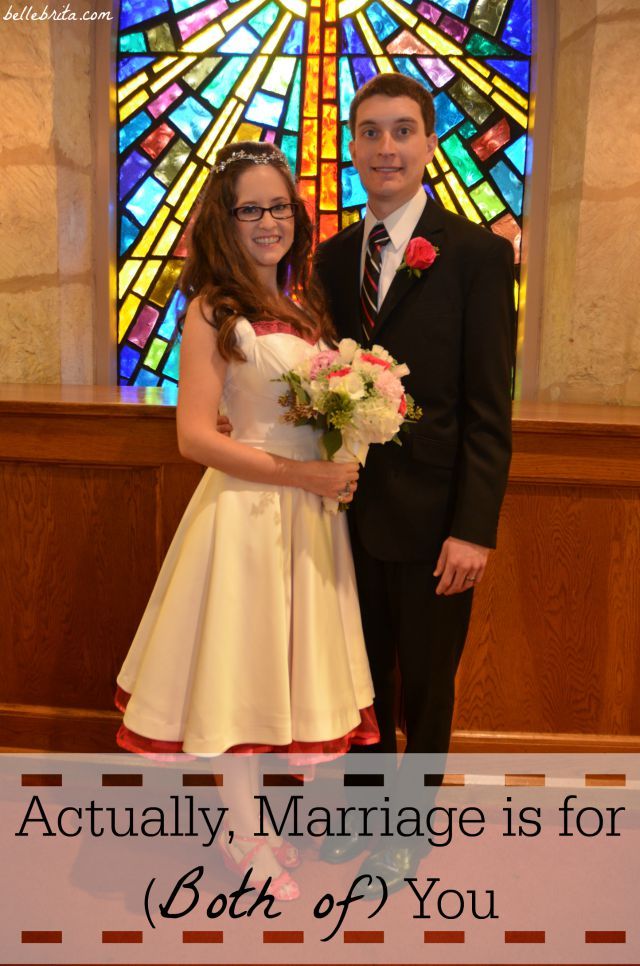This is an updated and revised essay that I wrote in 2013 and shared with a few friends. Belle Brita did not exist then, so I’m posting it here today.
Two years ago, a blog post titled, “Marriage Isn’t For You” went viral. In it, a smug newlywed tells everyone exactly how to have a successful marriage with some vague platitudes about selflessness. (And now this drivel is a book. Go figure).
I didn’t plan on reading it, but I couldn’t ignore all my friends and family members who kept sharing it. Eventually, I gave in and read it.
On the surface, I liked it. Marriage shouldn’t be selfish. I can dig that.
But something held me back from sharing it. Something about the post just felt off to me.
Only by reading two criticisms was I able to pinpoint why Seth’s post troubled me.
Telling someone that “a true marriage (and true love) is never about you. It’s about the person you love—their wants, their needs, their hopes, and their dreams. Selfishness demands, ‘What’s in it for me?’, while Love asks, ‘What can I give?’” is a form of gaslighting; it reinforces the idea that even if they’re suffering, well, happiness isn’t the point of being married, is it, and you don’t want to succumb to the “Walmart philosophy,” do you?
Unfortunately, the blog Her Journey of Hope no longer exists. Luckily I saved this quotation from the blogger’s response, “On Christians’ Fear of Happiness.”
It may sound great initially to talk about putting others first, because it is good to care about others and reach out and give of ourselves. Relationships require a mutual giving and taking and it can be really beautiful.
The dark side is that this so-called selfishness is that it is usually not “selfish” at all. It’s usually self-care, being happy, doing things you like just because it’s fun. True selfishness, as my friend pointed out, is a lack of caring about others, and to best care about others, we have to take care of ourselves.
These two bloggers illustrated the main reasons the viral post makes me uncomfortable.
1) The language is similar to justification used to control women in abusive relationships
2) It promotes an unrealistic standard of selflessness that is usually unevenly applied towards women
The post is written by a man, about advice from his father, on why he should get married. Seeing the advice in a different context, from a male point-of-view, is why I struggled to notice these two specific problems.
At one point in my past, I had to cut myself off from an abusive platonic relationship. There were definitely people who thought I was selfish for removing this person from my life, but I was protecting myself. Protecting yourself against abuse, whether it’s physical, emotional, psychological, or other, is never selfish.
If marriage were only for someone else, I would have ended up with the first guy I ever kissed, who’d had feelings for me back then, who all of our friends and family wanted me to date. Marrying that guy wouldn’t have been for me–it would have been for him, for our friends, for our family–and I would have been miserable. That is exactly what Seth is advocating.
If marriage were primarily about future children, Dan wouldn’t be with me. I have Crohn’s Disease. His mother has Ulcerative Colitis. Any future child of ours is at high risk to develop Crohn’s or Colitis. If children were Dan’s biggest concern in marriage, he would have chosen someone younger and healthier.
But neither of us is that selfless. Yes, we both routinely put the other person’s needs first. Yes, I shouldered more responsibility while Dan was unemployed, and he took care of me first while my Crohn’s was bad and then when my mom died.
But I married Dan because I couldn’t imagine living my life without him. I married him because I didn’t want to spend my life with anyone else. I married him because I’m head-over-heels in love with him.
I married him because I’m happy when we’re together. The fact that he’s also happy when when we’re together is why we’re perfect for each other.
Wanting to be happy is not selfish. Wanting to be happy in a relationship is not selfish either.
I also want to share Dan’s thoughts on this topic. I asked him to read the article so we could discuss it together. He summed it up perfectly.
“Love is about someone else. But marriage is a mutual commitment between two people.”
I couldn’t have put it better myself!
How can you be selfless in a relationship while still practicing self-care? I’d love to hear your thoughts!



I completely agree with Dan I see marriage as a long term commitment to the love that two people share. x
Which you get to embark upon soon!!!! 😉
I love Dan’s quote. Right now I’m working on the practicing self-care part. My last relationship I focused my effort entirely on him, and I think that’s one reason why that relationship failed. It’s a give and a take, always!
Dan’s pretty wise. That’s why I married him! 😉
I actually think that since Dan and I started off long-distance, that helped us not get too wrapped up in each other during the heady exciting early stages. I couldn’t focus everything on him because I was in NY and he was in Ohio! Living together took some readjusting to make sure we were both happy, but honestly, living with him makes me SO happy that the readjustments were easy.
I love this!! I could write a novel response, but I won’t. I’ll just say that this is perfect 🙂
Thank you! With your marriage experience, it’s reassuring to know you agree. <3
I absolutely agree. In fact, I just wrote a post about communication in marriage where I shared a story about how I wasn’t happy and I told Pearson what was making me unhappy and he changed things. I don’t think that’s selfish. I think it’s necessary. I do see the sentiment in Seth’s words, and I think the first time I read the article, I really liked it, but I don’t have any experience with abusive relationships or the like. The older I’ve gotten and the more I’ve seen and read about these things, the more realized I agree with what you’ve said here. And I love Dan’s quote!
I read that post! I’m not sure if I commented or not. Yeah, communication about your needs is SO important. I’ve had to learn to communicate in Dan’s style since he’s very analytical. He hasn’t really learned to communicate in my style yet, but at least he’s stopped interrupting me. 😉 Plus since I have better communication skills overall, I don’t mind bridging the gap between us.
I think most people peddling bad relationship advice don’t know anything about abusive relationships. And it’s not bad per se to not understand that. It means you’ve been very fortunate! But as a very involved, very informed, very passionate feminist, I’ve been actively studying this for about a decade now. I quite sadly hold the confidence of too many women who were in abusive relationships. One thing that I’ve read over and over and over is how abusers use the same sort of language that sounds reasonable to justify their actions. Because their victims have heard that in relationship advice, they end up normalizing their abuse.
That’s why I am so so careful when wording my relationship advice. If anything could possibly be misconstrued, I add as many clear caveats as necessary.
If you need marriage counselling come see us, Jewish Family Services, we are based in Atlanta. We can help you! We serve people of all religions.
Really true and to the point. Marriage is about love and spending your life with that person. It is not really about selflessness. It about two people who love each other and want to make a life together. They want to make each other happy and they both give of themselves out of love. Thanks for sharing.
This is so good! I do love how being in a relationship can cause you to see how selfish you are in bad ways, and it definitely helps you to grow in that. But you’re right taking care of yourself and wanting to be happy isn’t selfish! I think that healthy communication about each of your needs and desires is key.